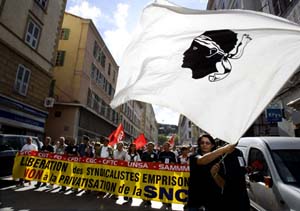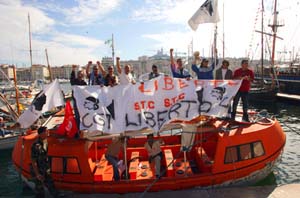lead article
French ‘terror’ troops attack striking sailors
Protests erupt in Corsica, Marseille


|
Reuters photos by Jean-Paul Pelissier (bottom) and Eric Gaillard (top)
|
Thousands march October 1 (top) in Bastia, Corsica, a French colony in the Mediterranean, to protest raid by French “antiterrorist” unit on striking seamen who had taken over a ferry operated by the state-owned SNCM line. Banner reads: “Free the imprisoned unionists! No to SNCM’s privatization!” Strikers protested the same day on an emergency boat in Port of Marseille, a city in southeastern France (bottom).
|
BY BRIAN WILLIAMS
Deploying five helicopters with 50 commandos, a French “anti-terrorist” squad launched an assault September 28 on striking seamen from Corsica who had taken over a ferry ship in the Mediterranean. The sailors, members of the Union of Corsican Workers (STC), struck over the French government’s plan to privatize the state-owned Corsica-Mediterranean ferry line (SNCM). The ferry operates between France and the island of Corsica, a colonial possession of Paris.
Unionists at SNCM in Marseille in southeastern France also walked out, occupying SNCM ships September 21. Six days later port workers struck, paralyzing all port operations there.
French prime minister Dominique de Villepin ordered the raid, which shows that Paris is using the “war on terror” against the labor movement.
In response, protests and further strike actions swept through Corsica. Nine labor unions and other groups organized a demonstration October 1 in the Corsican city of Bastia. Organizers said the demonstration involved at least 9,000 people, the Associated Press reported. A day earlier, airport workers and firefighters in Corsica walked out in solidarity with the striking unionists.
Backed by an EC-145 helicopter and armored vehicles, French police attacked striking seamen October 1 in the Corsican city of Ajaccio. Using trucks and trailers, the strikers were blocking access to the only cargo vessel in the port. Shortly after this raid, cops stormed two petrochemical and oil terminals in the port of Marseille that workers had occupied for six days. Dock workers there walked out in response.
Alain Mosconi, leader of the dockers and seamen branch of the STC, announced the lifting of the blockade of Corsican ports October 2, at least for a couple of days. The move allowed stranded tourists to leave the island nation and necessary medicines to be brought in.
In France, a nationwide strike took place October 4 to demand public sector pay raises and to protest new antilabor legislation. Solidarity with the SNCM strikers was a theme of protest demonstrations in Marseille, where tens of thousands marched, and other French cities that day. Mosconi said that strike and other protest actions in Corsica could resume after October 4, reported the International Herald Tribune.
Privatization of SNCM would eliminate about 400 jobs out of the 2,400 workers in the state-owned company. Some 40 members of the STC began moving the Pascal Paoli ferry from the waters by Marseille September 27 to demonstrate opposition to privatization. There were no passengers aboard. The French commando assault took place the following day near the port of Bastia.
“Covered by airborne snipers, 50 hooded men from the paramilitary gendarmerie intervention group, the French antiterrorist unit, slid down ropes on to the deck,” reported the Times of London. The workers “were made to kneel while other officers handcuffed their leaders.”
The French gendarmes then forced the crew to take the ship back to the city of Toulon. Four of the union leaders on board were arrested on hijacking charges there. They were released from jail 48 hours later. Cheering crowds gave them a heroes’ welcome upon their arrival in Corsica. If convicted, the unionists could face up to 20 years in prison.
Among those condemning the commando assault is Jean-Guy Talamoni, a leader of the Corsican independence movement. “This is a disproportionate operation by the colonial French police and army against unarmed workers,” he told the media.
In an October 3 telephone interview with the Militant, SNCM worker Marc Kinzel in Marseille reported that Confederation of Labor (CGT) members there began occupying about 10 SNCM ships September 21. They did so in response to a government ultimatum that the workers either accept complete privatization or the company would be liquidated. Kinzel, who has worked at SNCM for six years, is a member of the CGT and has been part of the walkout. The STC joined the strike five days after it began in Marseille, he said. “The strike intertwines a labor dispute and the national question,” Kinzel said. “The Corsican sailors have their own trade union federation, the STC, which calls for national independence for Corsica.”
Corsica was first taken over by France in 1768. The fight for national self-determination has been an important political factor there for more than two centuries. In 2003, the island’s 260,000 residents voted against an autonomy plan Paris promoted to gain acceptance for the nation’s colonial status.
|



